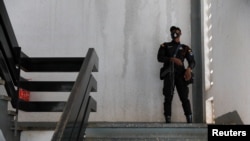Opposition lawmakers in Ghana are pushing President Nana Akufo-Addo into a tight spot by promoting an anti-LGBT law widely condemned by critics for undermining rights but applauded by many Ghanaians.
Gay sex is already illegal in the highly religious West African nation, but while discrimination against LGBT (lesbian, gay, bisexual and transgender) people is common, no one has ever been prosecuted under the colonial-era law.
A proposal that includes criminalizing LGBT advocacy, requirements to denounce "suspects", advocates for conversion therapy and imposes longer jail sentences was introduced in parliament earlier this month.
The international community has joined activists in condemning the "promotion of proper human sexual rights and Ghanaian family values bill" drafted by eight lawmakers, mostly from the opposition party.
"Adopting the legislation in its current or any partial form would be tantamount to a violation of a number of human rights standards, including the absolute prohibition of torture," a group of UN experts said in a statement.
"It will not only criminalize LGBTI people, but anyone who supports their human rights, shows sympathy to them or is even remotely associated with them."
If the text is passed by parliament, the president can either decide to ignore critics and sign it, or veto it -- something analysts and diplomats say he may be unwilling to do, given widespread support for anti-LGBT legislation.
Nearly 90 percent of Ghanaians said they would approve of a decision by the government to criminalize same-sex relationships, according to research group Afrobarometer using 2014 data.
Knowing how popular it would be, "the opposition party is using this a major political tactic to get the current government to take a position one way or the other for political reasons," said Human Rights Watch (HRW) researcher Wendy Isaack.
'Demagogic' bill
Akufo-Addo, who won a second term in office in December, has said publicly that same-sex marriage would not become legal under his watch.
But the British-educated former rights lawyer with a cosmopolitan reputation has nothing to win from this proposed bill, analysts and diplomats say.
"There is nothing in it for him... it's not his bill, he didn’t initiate it," said Henry Kwasi Prempeh, director of the Ghana Center for Democratic Development.
A western diplomat who asked to remain anonymous said it was "quite obvious he (the president) is not very fond of this bill... but it's a delicate issue, they can see the general public opinion."
The opposition has a "red carpet to surf on a homophobic wave and come up with a law that is particularly demagogic," another senior diplomat said.
Lawmakers pushing for the bill argue that homosexuality is foreign to Ghanaian culture.
"We need to protect our children who are currently being targeted by these LGBTQ+ people making them believe that it's the new way of life," one of its main sponsors, Samuel Nartey George, told AFP.
"Our culture should not be destroyed."
Activists like Davis Mac-Iyalla, director of the Interfaith Diversity Network of West Africa, have widely criticised that cultural argument.
"To tell me that it’s not part of our culture and that these people don’t exist, I would say it’s a blunt lie, people know LGBT in their communities, in high places," said Ghana-based Mac-Iyalla.
The debate is coming at an inconvenient time for the president who wants to attract African-Americans and the Ghanaian diaspora through his program "The Year of Return".
With a reputation for stability and respect for the rule of law, Ghana has also attracted businesses like Twitter who said it would open its first Africa office in the country.
"If we’re getting the accolades we get, it’s not for anything else but because we are a free society," said Prempeh.
"If this is where you get your influence... and you’re going to attack that, it makes really no sense."
Increased homophobia
Most people don’t really believe he will sign it," said Danny Bediako, director of human rights organization Rightify Ghana, "but it's difficult, because religious institutions are very powerful here."
Activists worry Ghana will follow the same path as Nigeria and Uganda, where similar bills were passed in recent years.
"When countries legislate prohibitions around association and freedom of expression, which are fundamental human rights that are protected under international law," said Isaack, this "gives members of the public the authority, the tools, to perpetrate violations."
"People are attacked on the streets, people don’t get medical treatment... people are kicked out of schools, people are kicked out of their homes."
Bediako and Mac-Iyalla both say they personally know LGBT people in Ghana who are already thinking about leaving the country.
"The sad situation is that it has really led to an increase in homophobia in Ghana," said Bediako.
"Many are already in serious dilemma," said Mac-Iyalla, and "there’s a high interest in fleeing Ghana already, because of the threat coming."








